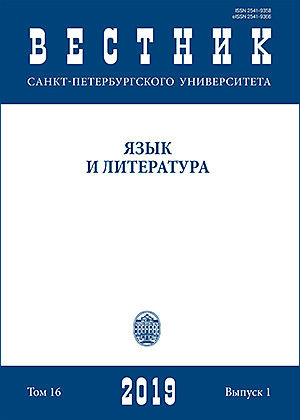On six Dutch translations of “Fathers and Sons”
DOI:
https://doi.org/10.21638/spbu09.2019.110Abstract
The article focuses on six Dutch translations of I. S. Turgenev’s novel “Fathers and Sons”, made in 1870, 1918, 1919, 1947, 1955 and 1991, which are a perfect example of translation plurality. The first translation was done via French as an interlingua, the second one directly from Russian into Dutch. The translations are analyzed at macro- and micro-levels. The background of the origin of these translations, brief information about the translators is provided in the paper, with a special focus on the 5-volume issue of Turgenev’s works by the publishing house “Van Oorschot” in the edition “Russian Library”. With reference to the facts of Turgenev’s influence on Dutch writers of different generations, the authors highlight the closeness of the novel “Fathers and Sons” to the core of the Dutch literary polysystem. The analysis at the micro-level includes the comparison of six different ways of translating proper names and Russian personal pronouns «ты» — «вы», phraseological units, culture-specific elements, descriptions of nature as well as the overview of mistranslations. Whereas early translations are characterized by expliciticity and are abound of commentaries on Russian phraseological units and culture-specific elements, the modern ones are considerably more precise and laconic. The authors conclude that the first three translators were not quite proficient in Russian and not always strictly adhered to the translational mechanism; the translation of 1947 is much more professional whereas the translations of 1955 and 1991 are flawless in terms of accuracy and the choice of adequate linguistic equivalents; the Dutch variant of 1955 meets the principles of a high-quality translation, and the translation of 1991 includes the elements of dynamic equivalence.
Keywords:
translation plurality, translating culture-specific elements, translating phraseological units, I. S. Turgenev, Fathers and Sons, Dutch literature, literary influence
Downloads
References
Литература
Алексеева 2017 — Алексеева И. С. Текст — перевод — культура. СПб.: Изд-во РГПУ им. А. И. Герцена, 2017. 399 c.
Казакова 2006 — Казакова Т. А. Художественный перевод. Теория и практика. СПб.: ИнЪязиздат, 2006. 535 с.
Михайлова 2015 — Михайлова И. М. Русистика в Нидерландах. В кн.: От Лиса Рейнарда до Сна богов история нидерландской литературы. Верхейл К., Куттенир П., Михайлова И. М. (ред.). Т. 3. СПб.: Alexandria, 2015. С. 105–107.
Тюленев 2004 — Тюленев С. В. Теория перевода: учебное пособие. М.: Гардарика, 2004. 334 с.
Шерстнева 2008 — Шерстнева Е. С. Переводная множественность как категория переводоведения: история, статус, тенденции. Известия Российского государственного педагогического университета им. А. И. Герцена. 2008, 73 (1): 526–532.
Even-Zohar 2000 — Even-Zohar I. The Position of Translated Literature in the Literary Polysystem. In: Venuti L. (ed.). The Translation Studies Reader. London, New York: Routledge Publ., 2000. P. 192–197.
Hulst 2010 — Hulst J. Het product centraal: criteria en methoden voor de evaluatie van vertalingen. In: Naaikens T. et al. (red.) Denken over vertalen. Tekstboek vertaalwetenschap. Nijmegen: Vantilt, 2010. P. 321–334. (На нидерл.)
Schendel 1989 — Schendel А. van. Jeugdherinneringen. Een document. Amsterdam: Meulenhoff, 1989. 93 p. (На нидерл.)
Schouten 2015 — Schouten R. Balzac, Toergenjev, James, Kellendonk. Extaze. 2015, 2: 30–33. (На нидерл.)
Verheul 2013 —Verheul K. Voorwoord. In: Achmatova A., Majakovski V., Tsvetajeva M. Ode aan de voetganger. Amsterdam: Van Oorschot, 2013. P. 5–10. (На нидерл.)
References
Алексеева 2017 — Alekseeva I. S. Tekst — perevod — kul‘tura [Text — Translation — Culture]. St. Petersburg: Herzen Russian State Pedagogical University Press, 2017. 399 p. (In Russian)
Казакова 2006 — Kazakova T. A. Khudozhestvennyi perevod. Teoriia i praktika [Literary Translation. Theory and Practice]. St. Petersburg: Iniazizdat, 2006. 535 p. (In Russian)
Михайлова 2015 — Mikhailova I. M. [Russian Studies in the Netherlands]. In: Ot Lisa Reinarda do Sna bogov. Istoriia niderlandskoi literatury. Verheil K., Kuttenir P., Mikhailova I. M. (eds.) Vol. 3. St. Petersburg: Alexandria Publ., 2015. P. 105–117. (In Russian)
Тюленев 2004 — Tiulenev S. V. Teoriia perevoda: Uchebnoe posobie [Translation Theory: Manual for Students]. Moscow: Gardarika Publ., 2004. 334 p. (In Russian)
Шерстнева 2008 — Sherstneva E. S. [Translation Plurality as a category of Translation Studies: History, Status, Tendencies]. Izvestiia Rossiiskogo gosudarstvennogo pedagogicheskogo universiteta im. Gertsena. 2008, 73 (1): 526–532. (In Russian)
Even-Zohar 2000 — Even-Zohar I. The Position of Translated Literature in the Literary Polysystem. In: Venuti L. (ed.). The Translation Studies Reader. London, New York: Routledge Publ., 2000. P. 192–197.
Hulst 2010 — Hulst J. Het product centraal: criteria en methoden voor de evaluatie van vertalingen. In: Naaikens T. et al. (ed.) Denken over vertalen. Tekstboek vertaalwetenschap. Nijmegen: Vantilt, 2010. P. 321–334.
Schendel 1989 — Schendel А. van. Jeugdherinneringen. Een document. Amsterdam: Meulenhoff, 1989. 93 p.
Schouten 2015 — Schouten R. Balzac, Toergenjev, James, Kellendonk. Extaze. 2015, 2: 30–33.
Verheul 2013 —Verheul K. Voorwoord. In: Achmatova A., Majakovski V., Tsvetajeva M. In: Ode aan de voetganger. Amsterdam: Van Oorschot, 2013. P. 5–10.
Downloads
Published
How to Cite
Issue
Section
License
Articles of "Vestnik of Saint Petersburg University. Language and Literature" are open access distributed under the terms of the License Agreement with Saint Petersburg State University, which permits to the authors unrestricted distribution and self-archiving free of charge.






